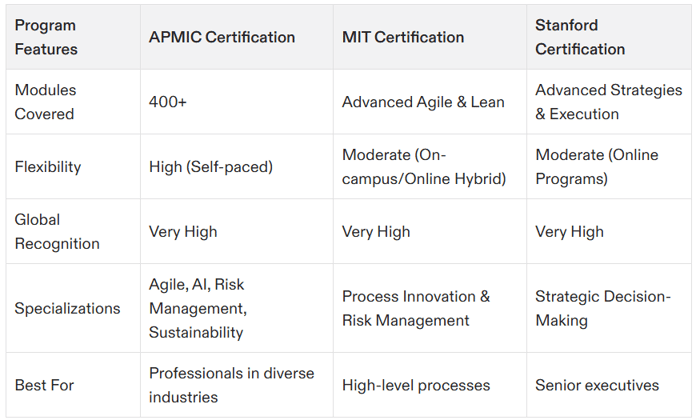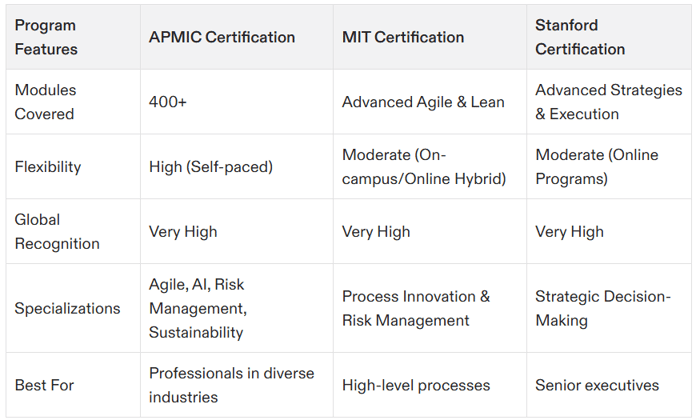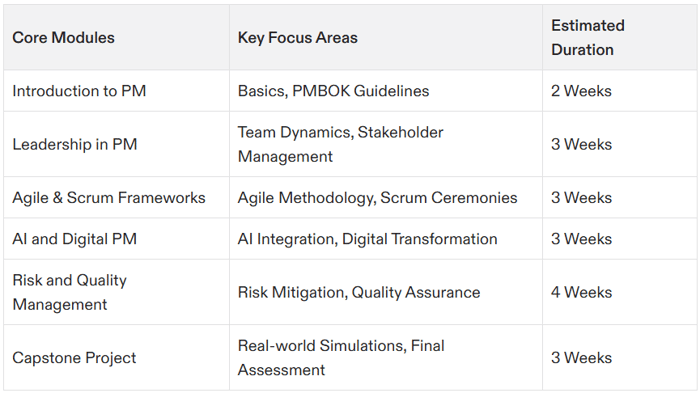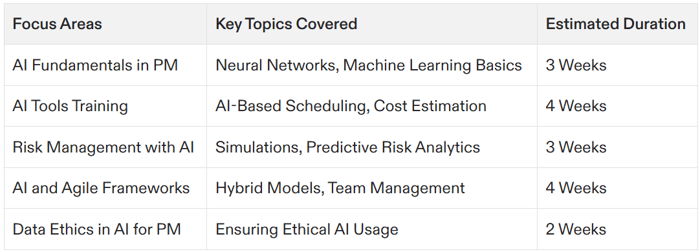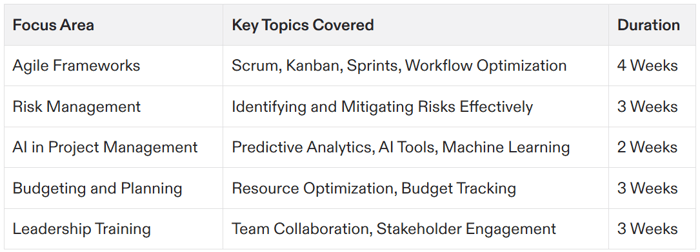Table of Contents
- Exploring the Best Schools for Project Management Certification
- Why Choose a School for Project Management Certification?
- How to Select the Best Schools for Project Management Certification
- Best Schools for Project Management Certification
- Why Certifications from Best Schools Matter
- FAQs About Best Schools for Project Management Certification
- Q1. What are the key benefits of attending the best schools for project management certification?
- Q2. Can I complete certifications online from these schools?
- Q3. Are best schools’ certifications better than short one-off courses?
- Q4. How long do these programs take to complete?
- Q5. Is APMIC certification better than MIT’s certification?
- Comparison of Top Certification Programs
- Final Thoughts
Exploring the Best Schools for Project Management Certification
Becoming a certified project manager can be your gateway to lucrative opportunities across industries such as tech, construction, healthcare, and finance. However, standing out in this competitive field requires more than just experience. Recognized certifications from the best schools for project management certification can be your competitive edge.
If you're seeking comprehensive programs offering global recognition, structured learning, and industry-relevant tools, you're in the right place. This blog will guide you through the criteria for selecting a project management school, highlight top programs, and show why certain certifications like the APMIC certification make a significant difference.
Why Choose a School for Project Management Certification?
The demand for certified project managers continues to soar. According to the latest industry reports, employers prioritize candidates with formal certifications that validate their skills. But selecting a school isn’t simply about a prestigious name—it’s about finding a program tailored to your aspirations.
Here are some key reasons to enroll in one of the best schools for project management certification programs:
1. Global Recognition
Top schools like MIT, Stanford, and accredited bodies like PMI offer industry-recognized programs that carry weight globally.
2. Structured Curriculum
These schools offer certified curriculums rooted in real-world project management practices, covering methodologies like Agile, Waterfall, Lean, and more.
3. Career Advantages
Training from a reputable institution often results in better job opportunities and salary prospects. Certified project managers typically earn 20%-30% more.
4. Comprehensive Tools and Techniques
Top schools ensure hands-on training in software and tools like MS Project, JIRA, and Trello. Pairing this with programs like the APMIC certification, which dives into over 400 modules and cutting-edge topics like AI and sustainability, makes you a powerhouse in the workplace.
How to Select the Best Schools for Project Management Certification
1. Accreditation Matters
Choose schools affiliated with recognized organizations like the PMI (Project Management Institute), APMIC, or universities offering globally respected programs. Credibility ensures your certification is valued globally.
2. Tailored Curriculum
Evaluate the content and ensure it covers traditional methodologies and emerging advancements like Agile, digital collaboration tools, and innovation. Programs like the APMIC certification offer unparalleled versatility with 400+ modules spanning core and advanced topics.
3. Flexible Learning Options
Consider whether you need a self-paced online program, hybrid learning, or on-campus training. The best schools often provide options to meet diverse schedules.
4. Successful Alumni Network
Institutions with alumni excelling as CEOs, directors, and project managers indicate strong programs with solid career support.
5. Affordability and ROI
Evaluate cost-to-benefit ratios. Some highly priced programs are worth the investment, while others may offer similar value at a lower cost.
Best Schools for Project Management Certification
1. Massachusetts Institute of Technology (MIT)
MIT’s Professional Development Program offers cutting-edge training in Agile and Lean methodologies. It focuses on process innovation, risk management, and team collaboration. While intense, this program is highly prestigious.
2. Stanford University
Stanford’s Advanced Project Management Certification merges theory with practical application. It is ideal for senior executives and those navigating high-complexity environments.
3. APMIC Certification
The APMIC certification stands out for its expansive curriculum of 400+ modules. It covers mainstream project management principles like Agile and Risk Management while introducing emerging topics such as AI integration, digital transformation, and sustainability. APMIC certifications are globally recognized, making them ideal for professionals across any industry.
4. Project Management Institute (PMI)
PMI’s PMP certification program is one of the most respected globally. It is designed for experienced managers keen to validate their skills. The curriculum emphasizes leadership, strategic thinking, and tools like JIRA and MS Project.
5. Cornell University (eCornell)
Cornell’s online certification program appeals to managers seeking flexibility. Modules focus on real-world problem-solving and risk assessment in industries like construction, IT, and healthcare.
6. University of California, Berkeley
UC Berkeley offers tailored project management tracks catering to IT professionals and senior managers. This program combines structured learning with flexible, online sessions.
Why Certifications from Best Schools Matter
Certifications from the best schools for project management certification can be a game-changer in your professional growth. These programs don’t just enhance your resume; they prepare you for the future of work in a dynamic global market. Here’s why they matter:
1. Improves Employability
A certification from a top-ranked school signals excellence and commitment. Employers view these credentials as proof that you’ve received structured training in advanced project management principles. This is particularly critical in high-stakes roles where managing budgets, teams, and timelines require precision.
For example, earning a globally recognized certification like the APMIC certification or one from institutions like MIT or Stanford adds credibility to your resume. It signifies adaptability and a drive for lifelong learning, qualities that hiring managers prioritize. Professionals with certifications from reputed schools often enjoy greater visibility on platforms like LinkedIn, leading to more job inquiries and opportunities. A recent survey found that certified project managers earn up to 22% more than their non-certified peers.
Furthermore, certifications from the best schools embed soft skills too—like leadership and strategic thinking—enhancing your interview performance and making you a better fit for modern workplaces. They don’t just make you a project manager; they shape you into a project leader.
2. Global Career Opportunities
Certifications from top schools aren’t limited by geography. The global recognition of programs offered by leading institutions ensures your skills are valued anywhere in the world. Whether you're exploring opportunities in North America, Asia, or Europe, these certifications act as your career passport.
Programs like the APMIC certification, with its 400+ modules, prepare you for international roles by encompassing industry best practices used across continents. For instance, someone certified in Agile methodology from a leading school has the chance to work in multinational industries like IT, healthcare, and finance, where Agile projects are booming globally.
Global job markets often favor candidates who bring internationally recognized expertise to their teams. Employers know that top schools provide rigorous coursework and incorporate real-world scenarios. A certification from a prestigious institution assures companies that you're ready to operate in multicultural, complex project environments seamlessly.
3. Mastering Tomorrow’s Tools
Technology is changing the way projects are managed. Top schools equip you with the latest industry-standard tools, enabling you to manage modern workflows effectively. Certifications often provide hands-on experience with platforms such as JIRA, Trello, Microsoft Project, and even emerging tech like AI project assistants.
For example, choosing a program like APMIC ensures exposure to cutting-edge technologies, including AI-driven project management dashboards, data analysis in decision-making, and cloud-based project tracking software. These tools are becoming indispensable as organizations shift to remote and hybrid work environments.
Additionally, top schools integrate frameworks like Agile and Scrum into their curriculum, making you proficient in practices that are becoming universal across industries. By mastering these tools and methodologies, you don’t just stay relevant—you gain a significant edge in a competitive job market. Consider a certified IT project manager leading a cloud migration project. Their deep understanding of tools like Azure and AWS will make them indispensable to their teams.
These programs also future-proof you. With business trends leaning toward sustainability and artificial intelligence, being trained in emerging areas ensures you're not just prepared for today’s challenges but tomorrow’s too. For instance, project managers adept at integrating AI solutions are now in high demand as industries increasingly automate their workflows.
FAQs About Best Schools for Project Management Certification
Q1. What are the key benefits of attending the best schools for project management certification?
Global recognition, access to advanced tools, structured learning, and better earning potential are some of the many benefits.
Q2. Can I complete certifications online from these schools?
Yes. Schools like MIT, Cornell, and organizations like APMIC offer online options to suit working professionals.
Q3. Are best schools’ certifications better than short one-off courses?
Yes. Certifications from reputable schools are backed by comprehensive training, expert faculty, and globally recognized standards, unlike many stand-alone courses.
Q4. How long do these programs take to complete?
Programs like APMIC’s offer self-paced options, while others, like PMP, can take 3-6 months depending on your commitment.
Q5. Is APMIC certification better than MIT’s certification?
It depends. APMIC’s 400+ modules offer unmatched versatility and depth, while MIT may focus more on niche methodologies like Lean. Aspiring managers often benefit from combining both.
Comparison of Top Certification Programs
Final Thoughts
Choosing the best schools for project management certification is critical to advancing your career. While prestigious programs like Stanford and MIT offer next-level learning, certifications like the APMIC certification provide unmatched depth, flexibility, and future-readiness.
For professionals prioritizing comprehensive knowledge, global recognition, and adaptability, programs like APMIC’s 400-module certification stand as the gold standard. Make an informed choice, and take the next step toward becoming a leading certified project manager equipped for the challenges of tomorrow.

